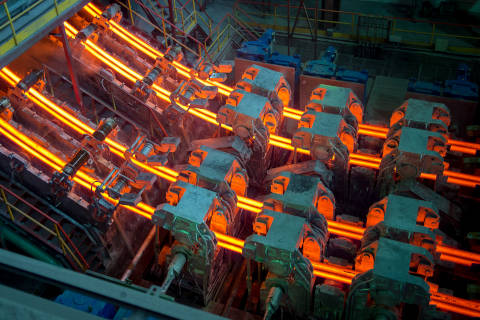The Evolution of Polyurea Greases: A Game-Changer in Continuous Casters
 Polyurea greases have revolutionized the lubrication industry, particularly in high-temperature and heavy-load applications like continuous casters in steel mills. Their development marked a significant advancement over traditional soap-thickened greases, offering superior performance and durability. This article delves into the history, structural innovation, and modern-day applications of polyurea greases, with a special focus on their critical role in continuous casting operations.
Polyurea greases have revolutionized the lubrication industry, particularly in high-temperature and heavy-load applications like continuous casters in steel mills. Their development marked a significant advancement over traditional soap-thickened greases, offering superior performance and durability. This article delves into the history, structural innovation, and modern-day applications of polyurea greases, with a special focus on their critical role in continuous casting operations.
The Birth of Polyurea Greases: A 1950s Innovation
The 1950s witnessed a breakthrough in lubrication technology with the development of polyurea greases. Before this, industries relied on lithium, calcium, and sodium-based soap-thickened greases, which often struggled with stability, temperature resistance, and water tolerance. Polyurea greases emerged as a robust alternative, providing solutions to these limitations and setting a new standard in industrial lubrication.
The Science Behind Polyurea Greases: Structural Innovation
At the heart of polyurea greases lies a unique diurea thickener structure, formed through a chemical reaction between diamine and diisocyanate. This structure imparts exceptional mechanical and thermal stability to the grease, along with a high dropping point and remarkable oxidative stability. Additionally, the development of Tetra Urea structures has further enhanced the performance of polyurea greases, offering even greater thermal stability and resistance to extreme enviro mental conditions. These innovations make polyurea greases stand out, particularly in demanding environments where traditional greases may falter.
Advancements and. Specialization: Catering to Industrial Needs
Over the decades, advancements in chemical engineering and a deeper understanding of
polyurea chemistry have led to the creation of specialized polyurea greases. By modifying base oils, additives, and thickener com- positions, manufacturers have tailored these greases to meet the rigorous demands of specific industries. Today, polyurea greases are integral to sectors requiring extreme temperature stability, enhanced load-carrying capacity, and resistance to harsh environmental conditions.
Modern Applications: Polyurea Greases in Continuous Casters
Polyurea greases are now a staple in various industrial applications, from electric motors and pumps to automotive components and heavy machinery. However, their most critical application lies in continuous casters within the steel industry. The extreme conditions of continuous casting, including high temperatures, heavy loads, and exposure to water and contaminants, necessitate a lubricant that can withstand such challenges. Polyurea greases excel in this environment, offering unmatched protection and efficiency.
Why Polyurea Greases are Essential for Continuous Casters
-
High-Temperature Stability: Continuous casters operate at intense temperatures. Polyurea greases maintain their structural integrity and lubrication efficiency, preventing premature breakdown and ensuring continuous operation.
-
Exceptional Mechanical Stability: The shear stability of polyurea greases ensures that they remain consistent under high shear conditions, crucial for the reliability of bearings and other components in continuous casters.
-
Superior Water Resistance: Water ingress is common in continuous casters. Polyurea greases resist water washout, maintaining a protetive film on components and preventing rust and corrosion.
-
Extended Service Life: Thanks to their exceptional stability, polyurea greases offer a long service life, reducing the need for frequent re-lubrication and minimizing maintenance downtime.
-
Resistance to Contaminants: Continuous casters are exposed to mill scale and other debris. Polyurea greases resist contamination, preserving their lubricating properties and protecting equipment surfaces from wear.
-
Oxidative Stability: Polyurea greases resist oxidation, preventing the formation of harmful by-products that could compromise component integrity and lead to premature failures.
-
Enhanced Load-Carrying Capacity: The robust load-carrying capacity of polyurea greases ensures protection against wear and damage under the heavy loads typical of continuous casting operations.
-
Broad Operating Temperature Range: Polyurea greases perform effectively across a wide temperature spectrum, making them suitable for different sections of continuous casters, from high-heat zones to cooler areas.
-
Compatibility with Various Base Oils: The versatility of polyurea greases allows them to be formulated with different base oils, tailoring their properties to meet the specific requirements of continuous casting processes.
The Future of Lubrication in Continuous Casters
Polyurea greases have become the lubricant of choice for continuous casters in the steel industry, thanks to their superior performance under extreme conditions. Their ability to deliver high-temperature stability, mechanical robustness, and long-lasting protection ensures the smooth and efficient operation of continuous casters, reducing maintenance costs and extending the life of critical components. As the steel industry continues to evolve, the role of polyurea greases in maintaining operational efficiency and reliability will only become more significant.
For more information, visit - https://www.molygraph.com/
